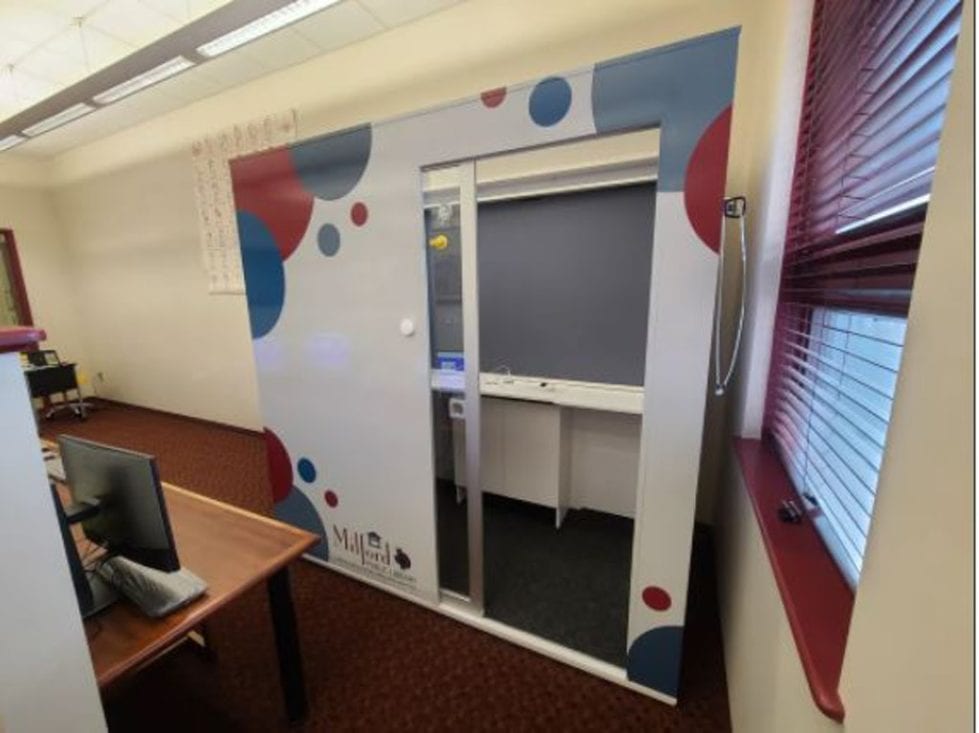

This soundproof booth can be found at the Milford library.
Check out a book, read a magazine, get your blood pressure checked, have a doctor’s appointment, meet with your lawyer – all these might be a reason to go to the library.
Social Service Kiosks are now available at Laurel, Seaford and Milford libraries. These kiosk are sound-proof, self-contained, wheelchair accessible spaces that fit two to three people. They are equipped with dedicated software-loaded computers to allow people to access telehealth services, online job interviews or even legal appointments.
“It’s what our community needs,” said Rachel Wackett, deputy executive director. “It’s our little part to fix the disparity we see every day.”
The kiosks arrived in March and are in a period of “soft opening,” right now while the libraries work out the best way to use them. Wackett said they expect it will be a combination of scheduled times mixed with the flexibility for people to walk in to use the facility.
Before and during the pandemic the library has been a place for people to come for help, said Wackett. Librarians have helped with everything from signing people up for benefits to helping them with filing taxes. The kiosks will help by providing safe and private places for treatment and online interaction, she said.
Error, group does not exist! Check your syntax! (ID: 11)
Nickolas Martin, telehealth coordinator for Delaware Libraries, said there were several motivating factors that prompted the Delaware Libraries to consider remote access to social services such as telehealth, as well as legal and employment opportunities.
They included a lack of behavioral health specialists in the state, notably Sussex County; increased depression and drug overdose rates statewide; and a general lack of access to internet and technology.
“For instance, in Sussex County, it is estimated that 12% of Sussex County residents do not own a computing device and 21% of Sussex County households do not have broadband internet,” Martin said. “The public libraries have some of the fastest internet in the state, and internet connection is a vital component to a successful telehealth visit, so the synergy was clear.”
While the kiosks are in a pilot phase now, “we have plans to expand this service statewide later this year,” Martin said. “Like libraries in rural communities, libraries in urban communities face similar barriers to social service access.”
The Seaford District Library offers access to social workers, employment specialists, English language instruction, notary services and certification testing. Besides the kiosk, the library also received a $150,000 grant to hire an onsite community health nurse.
Wackett’s hope is that all services would work together seamlessly. People could come to the library for a check-up by the nurse, or counseling with an intern. If the library patron then needed additional services they could secure them through a telehealth doctor and have the appointment privately in the kiosk. They could even sign up for insurance if they needed it.
The kiosk is outfitted with hand sanitizer. It is also set up to be sanitized with ultraviolet light after every use, said Wackett.
She also expects the kiosk to be used for people filing for criminal case expungements and immigrants to file for citizenship. In the past people would have to go to Philadelphia for immigration services, she said.
The kiosk is being piloted through public and private grants.
Wackett said even her staff has shown interest in using the kiosk to attend appointments without having to leave work.
To schedule time in a kiosk go to Delawarelibraries.libcal.com/appointments/socialservicekiosk.
For more information about the services available at Seaford District Library go to seaforddistrictlibrary.org.


Three Sussex County libraries now offer Social Service Kiosks, which are soundproof rooms designed to give library patrons privacy
Share this Post



